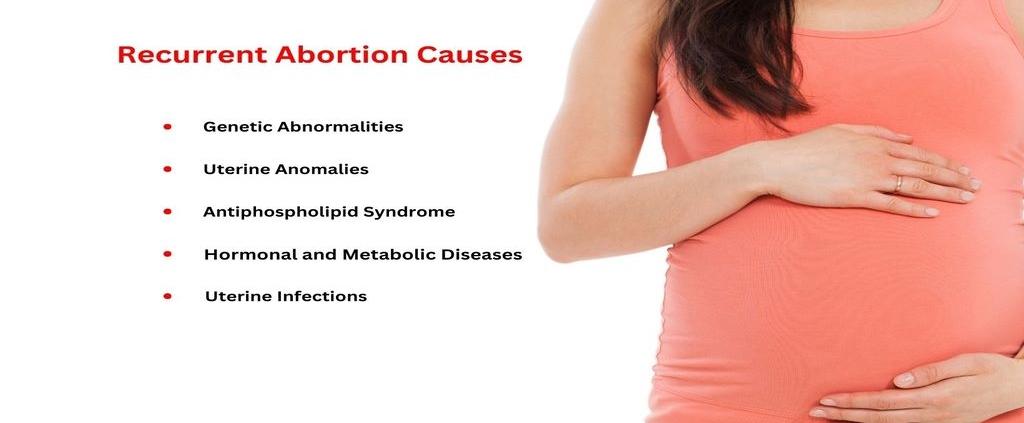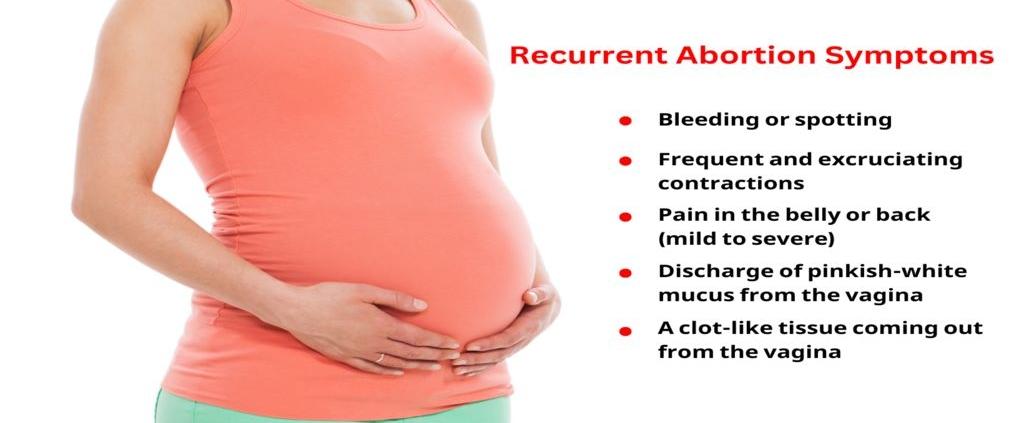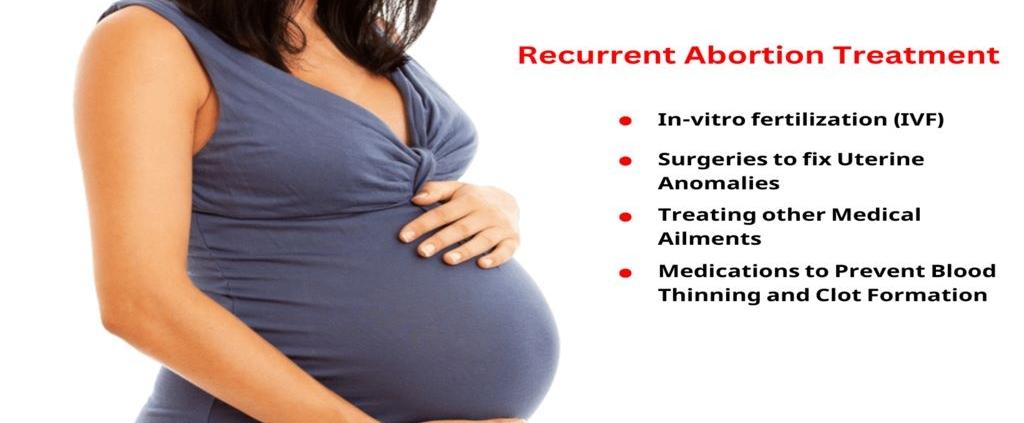What is Recurrent Abortion – Causes, Symptoms, and Treatment
Recurrent Abortion: A miscarriage is a common mishappening. Around 15 to 20% of couples have had a miscarriage in their journey to parenthood. However, if you have a miscarriage every time you try to carry your pregnancy to term, you may need to seek timely medical guidance from an obstetrician.
Miscarriage is an age-dependent event. The risk of miscarriage in women below 30 is lower than in women over 35.
What is Recurrent Abortion?
Suppose a woman has two or more consecutive miscarriages before 20 weeks of pregnancy or the first trimester due to some complications. In that case, it is termed recurrent abortion or recurrent pregnancy loss.
Around 2-5% of couples around the globe are affected by recurrent pregnancy loss.
Recurrent Abortion Causes

The root cause of recurrent abortion is complications in the embryo, the uterus, or the environment. Some of the recurrent abortion causes are stated below:
Genetic Abnormalities-:
The most common cause of recurrent abortion or recurrent miscarriage is genetic dysfunction. Twenty-three pairs of chromosomes are found in both men and women. 22 of the chromosomes are the same, but the last one decides the gender of the embryo.
The embryo takes half of the chromosomes from both parents. But sometimes, the chromosomes inherited by the embryo are abnormal. Due to these abnormal chromosomes, the woman has a recurrent abortion. The inheritance of abnormal chromosomes takes place naturally. However, this problem must be addressed by a fertility expert.
Uterine Anomalies-:
The uterus, or the womb, is the home of the growing fetus for nine months. Any problem associated with the shape of the uterus is bound to affect the embryo’s growth and may lead to recurrent miscarriage.
Uterine anomalies that lead to recurrent abortion are witnessed to affect 10-15% of women worldwide.
An abnormally shaped uterus in which only one side is fully developed, uterine fibroids, polyps, uterine septum, and double uterus in which the uterus is divided from the centre are some of the most common uterine anomalies.
Uterine anomalies are detected by running the following tests to determine the root cause and proceed with further diagnosis.
- Ultrasound
- Hysterosalpingography
- Sonohysterography
- Hysteroscopy
- Magnetic Resonance
- Laparoscopy
Antiphospholipid Syndrome-:
Antiphospholipid syndrome is a medical condition in which a person’s body starts producing antiphospholipid antibodies that attack the body’s internal system, resulting in the formation of clots and affecting pregnancy. The most common complications due to antiphospholipid syndrome that affect 3-15% of women include recurrent early abortion, late miscarriages, early preeclampsia, and stillbirths.
Hormonal and Metabolic Diseases-:
Metabolic and hormonal diseases like uncontrolled diabetes, PCOS, obesity, insulin resistance or insulin sensitivity, and untreated thyroid problems can be the causes of recurrent abortion. Also, if the female hormone responsible for a healthy pregnancy, progesterone, is not produced timely and in healthy amounts, this may lead to recurrent abortion.
Uterine Infections-:
Uterine and other bacterial infections like rubella, listeria, toxoplasmosis, and certain genital infections may contribute to miscarriages.
Apart from these, there are other less common causes of recurrent abortion, including stress, immunological causes that may treat the fetus as a foreign body and attack it, and cervical insufficiency.
Studies and research are still going on to identify the root cause of recurrent abortion and diagnose it accordingly.
Recurrent Abortion Symptoms

Recurrent abortion may or may not be accompanied by any symptoms. However, if you are doubtful about your pregnancy, there are specific recurrent abortion symptoms that you can watch out for, like-as:
- Bleeding or spotting
- Frequent and excruciating contractions
- Pain in the belly or back (mild to severe)
- Discharge of pinkish-white mucus from the vagina
- A clot-like tissue coming out from the vagina
- Visible and sudden vanishing of signs of pregnancy
- A constant feeling of grief
Preventive Measures to Avoid
If you want to increase your chances of delivering a baby by decreasing the risk of another miscarriage, there are certain precautions you can adopt for a positive outcome.
Experts state that the expecting couple can undertake the below-mentioned measures.
Plan Your Pregnancy at the Right Age-:
The risk of miscarriage increases with age. The rate of miscarriages witnesses a sharp increase once a woman crosses 30 years of age. This sharp increase is due to the increase in chromosomal abnormalities in the eggs produced by the ovaries. The most fertile age for women to become a mother is between 24 to 30. So, to reduce your risk of recurrent abortion, planning pregnancy at the right age is vital.
Maintain a healthy Body Mass Index-:
Medical experts believe a healthy body weight is essential for a healthy pregnancy. If the BMI is too low or too high, it may lead to complications in conceiving and sometimes may result in a miscarriage.
Proper and Timely Correction of Uterine Anomalies-:
Suppose the home of the growing embryo is not of the appropriate shape or has any other complication. In that case, it must be corrected timely under an experienced expert with the help of state-of-the-art technology available at fertility clinics like Imprimis IVF, Srinagar.
Check for any Antiphospholipid Syndrome Symptoms-:
Antiphospholipid syndrome must be checked for and diagnosed properly to end recurrent abortion.
Removal of Uterine Polyps and Uterine Fibroids-:
Uterine polyps and uterine fibroids should be removed if detected as the reason behind recurrent abortion.
Diabetes, Thyroid, and Kidney Problems must be addressed-:
Before thinking about conceiving, it is for the best that issues related to thyroid, kidney, and insulin production must be addressed to reduce the chances of recurrent abortion.
Addressing Hypertension Before Pregnancy-:
There is not much data to support the link between hypertension and pregnancy. However, experts believe that high blood pressure before conceiving may result in a miscarriage. So, it would help if you tried to bring your blood pressure under control to ensure a healthy and stress-free pregnancy.
Monitor Your Caffeine intake-:
It might be astonishing, but excessive caffeine consumption directly hampers your chances of carrying your pregnancy to term. Overconsumption of caffeine increases your heart rate as well as blood pressure. So, it is advised to cap your caffeine consumption to 150-200 milligrams per day to increase your chances of success in welcoming a healthy newborn.
Lifestyle Plays a Key Role-:
Following a healthy lifestyle can significantly help with a healthy pregnancy. The woman should avoid alcohol and tobacco during pregnancy to avoid any chances of miscarriage.
Recurrent Abortion Treatment

Recurrent abortion treatment is carried out after thoroughly examining the couple to identify the root cause. Based on the root cause, various treatment options are available to help prevent further miscarriages in women.
Some of the most trusted treatment options for recurrent abortion are stated below-:
In-vitro fertilization (IVF)-:
IVF treatment is a reliable option for couples with recurrent abortions. During this process, fertilization that naturally takes place in a woman’s vagina is carried out on a petri dish in a laboratory. Then after the successful fertilization of the egg, it is implanted in the woman’s uterus, where it grows for nine months.
Surgeries to fix Uterine Anomalies-:
After detecting the uterine anomaly, proper surgeries are undertaken by the reproductive specialist.
Treating other Medical Ailments-:
Diabetes, thyroid, and kidney problems are treated to increase the chances of a healthy nine months of pregnancy.
Medications to Prevent Blood Thinning and Clot Formation-:
Medications like Aspirin and Heparin are administered to the woman to avoid blood thinning and clotting.
The first step to diagnosing the problem of recurrent abortion is to consult an expert and avoid indulging in self-medication, as it may do more harm than good. Always remember stress-free lifestyle and a positive mindset are necessary for a healthy pregnancy.
Conclusion
We at Imprimis IVF understand that recurrent abortion can shatter hopes and bring sadness into your life. But the good news is recurrent abortion can be reversed with the proper treatment. The problem should be handled under the supervision and guidance of a good and experienced obstetrician. If you cannot carry a pregnancy to term, it is your calling to pay a visit to an obstetrician.










